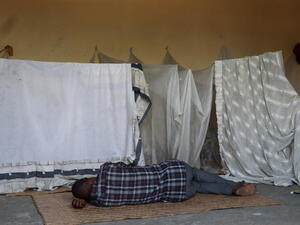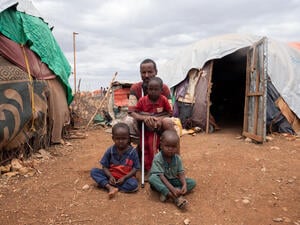Grateful Colombian refugee opens home to Venezuelans in need

Grateful Colombian refugee opens home to Venezuelans in need
Angelica Lamos Ballesteros, 51, was welcomed in Venezuela when gun-toting guerrillas forced her from her home in Colombia’s mountainous Norte de Santander department. Now back in Colombia, she has opened her home to Venezuelans in their hour of need.
“It’s time to give something back,” Lamos says in her home in a dusty hilltop suburb of Cúcuta, the Colombian city just west of the Táchira River from Venezuela, which is currently roiled by a crisis of its own.
Life on the porous, 1,300-mile-long-border between Venezuela and Colombia has long been fraught with people fleeing violence.
Having known only how to farm, Lamos – whose slight frame belies a steely confidence and determination – started anew in Venezuela 14 years ago, after crossing the border with just a bag of clothes.
However, after making a life and raising a family there, she was forced to return to Colombia in August 2015 when Venezuela ordered the deportation of Colombians from the border region. The move forced 20,000 Colombians, many displaced by Colombia’s long civil war, out of the country.
“People arrive here with nothing, so the priority is to give people somewhere to stay.”
“I opened up my home two years ago when the deportations happened,” says Lamos. “I lived there, I worked there, I had a life there, so I know what it’s like to have to leave it all behind. People arrive here with nothing, so the priority is to give them somewhere to stay.”
Skyrocketing inflation, widespread food and medicine shortages, political unrest and violence are causing Venezuelans to flee in their tens of thousands. Many follow in Lamos’s footsteps, crossing the border by land to Cúcuta, in the hope of building a better life, in some cases applying for asylum.
Now back in Colombia, Lamos lives in a colonial-style house, where she offers food, shelter and solidarity to Venezuelans escaping the crisis. Her home has a central courtyard where residents mingle, sometimes eating together. The rooms are spacious, with some families sharing a bed.

Women and children share a meal at former refugee Angelica Lamos's home in Cúcuta, Colombia.
“We have about 10 Venezuelans living here,” she says, gesticulating and animated. “Some people stay one month, or three months, until they can stand on their own two feet. We help them understand their rights in Colombia, we help them organize their papers.”
The Colombian government estimates that some 300,000 Venezuelans are now in the Andean country, where – despite the recent introduction of temporary work permits for those that crossed legally and overstayed their visas – there is little infrastructure to receive them.
More than 650,000 Venezuelans also cross regularly into Colombia using a Border Mobility Card, mostly to buy food and other basic goods. So far in 2017, 32,000 Venezuelans have applied for asylum worldwide, at a rate vastly higher than last year’s total of 34,000.
“Colombia has long been a country that produces refugees. Now it needs to adapt to be (one) that receives them.”
“Colombia has long been a country that produces refugees,” said Jozef Merkx, the country representative for UNHCR, the UN Refugee Agency. Worldwide, there are more than 340,000 Colombian refugees, on top of seven million internally displaced by the country’s conflict. “Now it needs to adapt to be a country that receives them.”
In their personal effort to welcome refugees, Lamos and her family also organize a monthly community lunch, which is free of charge. She charges a rock-bottom rent of US$1 a month to tenants, and understands when sometimes they cannot pay. “We also encourage them to work, to go door to door finding something they can do to fill their time.”

Venezuelan Oswell Mujica stands outside the shelter come hostel run by Angelica Lamos in Cúcuta, Colombia. He sells a sweet fermented drink called mazato made by women in the hostel to pay his way and his rent.
Venezuelan student Oswell Mujica, 19, is among those receiving her hospitality. He fled Caracas in January and arrived in Cúcuta with nothing. “I was looking for work but there was nothing, the government abandoned the people,” he says, speaking in a hushed tone in the central courtyard of Lamos’s spacious home.
“When I first came to Cúcuta I had to sleep in the streets but then I found this place.” He says he went hungry during his first weeks in Colombia. “It was just like Venezuela when I got here.”
Though many that pass through her home are fleeing hunger and violence, some say the threat of political violence forced them to leave. Keener González, 21, remembers the protests he saw in Caracas and the ruthless response.
“You can’t speak out against the government there,” he said outside Lamos’s house where he had attended a meeting on the rights of recently-arrived Venezuelans. “They beat protesters, they arrest people taking photos … I can’t live in a country like that.”
For Lamos, the decision to open up her home was a simple one. “Venezuelans are living a very difficult moment and it hurts me. I lived there and I was treated well at the time, but now the authorities are behaving terribly,” she said. “We are all human beings, and we all have rights.”








